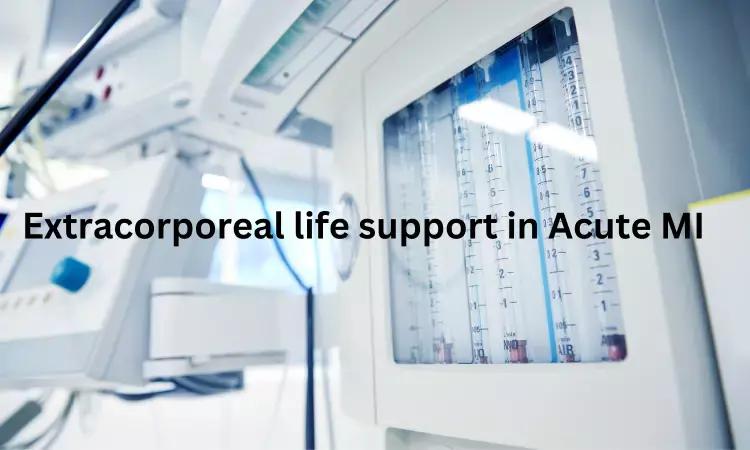Cardiogenic Shock and ECLS Study
Cardiogenic shock is a life-threatening condition in which the heart is incapable of pumping blood. As technology advances, more doctors are likely to find themselves assessing patients for early referral, discussing various support options with relatives, directly or indirectly managing patients on extracorporeal life support (ECLS).
However, ECLS lacks evidence regarding its effect on mortality. Aiming to throw light on the same, a team of researchers conducted a multicenter trial and revealed that ECLS had no survival benefit in patients having Acute Myocardial Infarction (MI) and revascularization. The risk of death from any cause at the 30-day follow-up was not different from patients receiving medical therapy. The study is published in the New England Journal Of Medicine.
Study Details
The current multicenter trial included patients with acute myocardial infarction complicated by cardiogenic shock for whom early revascularization was planned. They were randomly assigned to receive early ECLS plus usual medical treatment (ECLS group) or usual medical treatment alone (control group). The primary outcome was death from any cause at 30 days. Safety outcomes included bleeding, stroke, and peripheral vascular complications warranting interventional or surgical therapy.
Key Findings
- A total of 420 patients underwent randomization, and 417 patients were included in final analyses.
- At 30 days, death from any cause had occurred in 100 of 209 patients (47.8%) in the ECLS group and in 102 of 208 patients (49.0%) in the control group (relative risk, 0.98; 95% confidence interval [CI], 0.80 to 1.19; P=0.81).
- The median duration of mechanical ventilation was 7 days (interquartile range, 4 to 12) in the ECLS group and 5 days (interquartile range, 3 to 9) in the control group (median difference, 1 day; 95% CI, 0 to 2).
- The safety outcome consisting of moderate or severe bleeding occurred in 23.4% of the patients in the ECLS group and in 9.6% of those in the control group (relative risk, 2.44; 95% CI, 1.50 to 3.95).
- Peripheral vascular complications warranting intervention occurred in 11.0% and 3.8%, respectively (relative risk, 2.86; 95% CI, 1.31 to 6.25).
Researchers concluded that “In patients with acute myocardial infarction complicated by cardiogenic shock with planned early revascularization, the risk of death from any cause at the 30-day follow-up was not lower among the patients who received ECLS therapy than among those who received medical therapy alone.”
Reference
Holger Thiele, M.D., Uwe Zeymer, M.D., Ibrahim Akin, M.D., Michael Behnes, M.D., Tienush Rassaf, M.D., Amir Abbas Mahabadi, M.D., Ralf Lehmann, M.D., Ingo Eitel, M.D., Tobias Graf, M.D., Tim Seidler, M.D., Andreas Schuster, M.D., Ph.D., Carsten Skurk, M.D., et al.; Extracorporeal Life Support in Infarct-Related Cardiogenic Shock; New England Journal of Medicine, 1286-1297; https://www.nejm.org/doi/full/10.1056/NEJMoa2307227.



0 Comments
Post a comment
No comments yet. Be the first to comment!